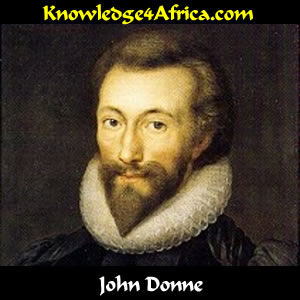|
READ THIS
This is a rather complicated but saucy love poem in which the poet addresses the Sun and speaks to him
about love and about his loved one.
The poet centres on the heat of passion and on the solitary focus of the two lovers: they are the centre
of the universe, while all wealth and happiness is but an imitation of their wealth and happiness.
 ABOUT THE POET
ABOUT THE POET
John Donne -- pronounced "Dunn" -- was born in London in 1572. His was a wealthy Catholic
family.
It was the time of the English Reformation, however, which meant that being a Catholic carried onerous
restrictions.
For example, although Donne went to both Oxford and Cambridge Universities, he could not graduate
without taking the Oath of Supremacy, something which he refused at the time to do.
His father left him a sizeable inheritance. The poet was a known womaniser, however, and made the
dreadful mistake of marrying one of these women in secret.
This caused his father-in-law to throw him into prison, refusing to pay his daughter's dowry.
The disgrace saw Donne cast out of a promising prosperous career. To mark this tragedy, Donne wrote
his now famous three line poem:
John Donne,
Anne Donne,
Undone.
It would take some ten years for the breach to heal and Donne's fortunes to look up.
At about this time the poet also decided to renounce the Catholic Church, probably because of the
advantages that being an Anglican would offer him.
His anti-Catholic writings soon caught the eye of King James himself who believed that Donne would be
a good churchman.
The poet, it seems, was then forced into taking Holy Orders against his will but nevertheless became
famous for the quality of the sermons which he preached.
Donne lived when the Voyages of Discovery were at their peak and talk was abounding of the New World
in the Americas.
Dinner parties would be dominated by maps showing the expansion of the British Empire versus the
regions being occupied by the Spaniards and the French.
Anne Donne died in 1617 while giving birth to their twelfth child. The poet's own life would take on a sickly
hue from then on, until he himself died in 1631.
Have you looked at the questions
in the right column?
|
TEST YOURSELF!
Read the left column and then answer
the following questions:
"Thy beams, so reverend, and strong
Why shouldst thou think?
I could eclipse and cloud them with a wink,
But that I would not lose her sight so long."
- "Thy beams, so reverend, and strong | Why shouldst thou think?" would appear at first reading
to have little meaning. Can you rewrite the lines so that the meaning becomes clear? (2)

[Need help?]
What about: "Why should you think that your sunbeams are so reverend and so strong"?
|
- What reason does the poet give for questioning the sun's power? (4)

[Need help?]
The poet merely has to wink -- of blink -- and the sun is totally blocked out from his sight. If a mere wink
can blot out the sun's light, surely then its power cannot be all that strong?
|
- Why, however, does the poet not want to take that route of winking or blinking? (2)

[Need help?]
If the poet winks, he will not only blot out the sun but will also blot out sight of his loved one.
|
"If her eyes have not blinded thine,
Look, and to-morrow late, tell me,
Whether both the Indias of spice and mine
Be where thou left'st them, or lie here with me."
- Comment on the extreme exaggeration in the words, "If her eyes have not blinded
thine". (2)

[Need help?]
The poet is claiming that his loved one's eyes are so radiantly beautiful that they shine more brightly than
the sun.
|
- What is the poet referring to when he says, "both the Indias of spice and
mine"? (4)

[Need help?]
News in the poet's day was full of reports about the voyages of discovery to both the east (India) and the
west (the West Indies).
India was the source of exotic spices which were worth a fortune because they could make putrid food
taste delicious.
The West Indies, on the other hand, was the source of gold, especially if the explorers went to Mexico and
Peru. Although be aware that the poet might be confusing the two, believing that spice came from both
the east and the west.
Both India and the West Indies therefore represented wealth, and yet the poet considered himself even
more wealthy because he had the affections and beauty of his loved one.
|
- What is the logic of the poet's statement: "Look, and to-morrow late, tell me, | Whether both the
Indias of spice and mine | Be where thou left'st them, or lie here with me"? (4)

[Need help?]
This is another example of exaggeration.
The wealth of both India and the West Indies, he says, is no longer there. It now lies in his bed because
his loved one is of universal wealth, eclipsing all other.
The poet is, of course, probably speaking of his lover's physical and sexual beauty.
|
"Ask for those kings whom thou saw'st yesterday,
And thou shalt hear, "All here in one bed lay."
- What is the logic or meaning of this statement? (4)

[Need help?]
In Stanza 3, the poet says that all princes (including kings) are merely an imitation of his own wealth when
he is in bed with his loved one.
Roll all the kings up into one, therefore, and they would only add up to the value of his loved one. All their
wealth, then, would be found in his bed, in the person of the one he loves. Exaggeration indeed!
Question: when he speaks about the kings, is he really talking about himself?
|
|



